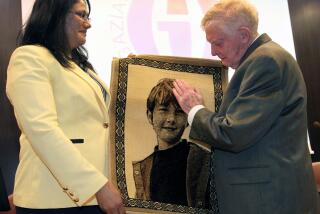Three Donors Tell Their Stories
- Share via
Ammie Conner Wanted to Save Her Husband
Ammie Conner desperately wanted to donate one of her kidneys to her husband, Jerry, who had finally begun dialysis after years of resisting.
“I’m tired,” he told her, and she just wanted him to feel good again.
Conner was 60, but her doctors said she was healthy and fit to donate. Only trouble: She and her husband had different blood types and were not a medical match.
Not one to take no, Conner went looking and found a program that would match them up with another patient and willing donor. Conner gave her kidney to a stranger in need, Jim Lewis. In turn, Lewis’ daughter gave her kidney to Jerry.
“There is no way to describe to you what an extraordinary experience it was,” Ammie Conner said.
She said she felt totally protected. Her surgical team was separate from her husband’s. She is sure that her doctors at Johns Hopkins Hospital in Baltimore had her best interests at heart.
Hopkins prepared her well for the surgery and its aftermath, she said, although she was disappointed when she still felt tired after two weeks. Her transplant coordinator had to remind her that she was 60 years old.
After another two weeks, she says, she felt good. By three months, she was “totally back to normal.”
“It’s as if it never happened,” she says now. “Except I look at my husband and see a wonderfully healthy person and, yeah, it did happen.”
*
Barbara Dillon Was Left With Excruciating Pain
Barbara Dillon remembers every word of that final conversation with her transplant coordinator. She was in tears. She had given half of her liver to her brother and, ever since, the pain had been excruciating.
“I said, ‘Please, you’ve got to help me. There’s something wrong with me,’ ” Dillon said. “He said, ‘Barb, there’s nothing more we can do for you.’ ”
She does not regret the donation because the piece of liver -- the only organ that, when divided, re-grows -- saved her brother’s life.
Still, she says, the intense abdominal pain and severe diarrhea was beyond anything she had expected, landing her on Vicodin, a narcotic painkiller, for nearly six months.
“I was just for weeks rocking back and forth saying, ‘I can’t go on like this,’ ” said Dillon, a registered nurse, now 49, of Dousman, Wis.
It’s not clear what caused her pain. But during the surgery, a clamp slipped off a major vein between the vital organs and the heart and liters of blood spilled out. A rib or two cracked.
And in patching her up, doctors shifted her appendix and bowels from the pelvis up behind her ribs.
Dillon needed four units of blood -- upsetting because she had offered to donate her own blood before surgery, just in case, and had been told it wasn’t necessary.
By the morning after surgery, she had gained 30 pounds of fluid.
While recipients’ insurance typically covers donor medical expenses, the procedure wound up costing Dillon thousands. Her insurance covered a follow-up gynecologic surgery -- except for a 20% co-payment, totaling nearly $5,000.
Transplant programs are supposed to report donors’ post-surgery conditions to the United Network for Organ Sharing. But like many donors, Dillon was never surveyed, even though she was easy to find -- she lives only an hour from the hospital where the procedure was done.
Before surgery, Dillon says she was told that she might die, but never told about the possibility of intense pain. She suspects that transplant programs intentionally minimize the risks.
“They all want to develop their programs,” she said. “They all want everyone to come to them.”
*
Mitzi Nichols Was Motivated by Altruism
The idea came to Mitzi Nichols when she was working at a dialysis center.
So many people with kidney failure, hooked to machines for painful sessions. She thought that someday she’d give one of her kidneys to someone who needed a transplant.
It was more than a decade later, after her daughter grew up, that she followed through, and in October 2001, she donated a kidney anonymously.
The hospital simply picked the next patient on the waiting list who was a medical match.
Nichols, now 43, was sore for five or six weeks and couldn’t turn over in bed for three months. She needed surgery to repair a hernia.
But she has no regrets and would donate again if only she had another spare kidney.
“I’m doing great,” she said. “I knew I was going to be sore. It didn’t surprise me.”
She got to meet her recipient a year after the surgery. He lives just 30 miles from her home in Virginia Beach, Va.
“It’s just a great feeling to know you’ve helped somebody live,” she said. “My mom says when God’s good to you, you have to give back. It was my way of giving back.”
More to Read
Sign up for Essential California
The most important California stories and recommendations in your inbox every morning.
You may occasionally receive promotional content from the Los Angeles Times.










